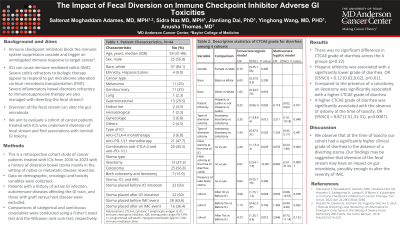Monday Poster Session
Category: Colon
P1930 - The Impact of Fecal Diversion on Immune Checkpoint Inhibitor Adverse GI Toxicities
Monday, October 28, 2024
10:30 AM - 4:00 PM ET
Location: Exhibit Hall E

Has Audio

Saltenat Moghaddam Adames, MD, MPH
The University of Texas MD Anderson Cancer Center, TX
Presenting Author(s)
Saltenat Moghaddam Adames, MD, MPH1, Sidra Naz, MD, MPH2, Jianliang Dai, PhD3, Yinghong Wang, MD, PhD2, Anusha Thomas, MD1
1The University of Texas MD Anderson Cancer Center, Houston, TX; 2University of Texas MD Anderson Cancer Center, Houston, TX; 3MD Anderson Cancer Center, Houston, TX
Introduction: Immune check point inhibitors (ICIs) are highly efficacious cancer therapies used in a wide variety of malignancies. ICIs work by blocking the immune system suppression cascade to create an unmitigated immune response against cancer. However, this unmitigated response can predispose patients to immune mediated colitis (IMC). IMC is graded via the Common Terminology Criteria for Adverse Events (CTCAE) classification system and can vary from a mild diarrhea to an aggressive colitis. It is known that diversion of fecal stream can alter the gut microbiota and thereby impact the severity of gut inflammation. In this study, we aim to study cancer patients on ICIs with diversion of fecal stream and its outcome on IMC.
Methods: This is a retrospective cohort study of cancer patients treated with ICIs from 2016 to 2023 with a history of diversion bowel stoma. Data on demographic, oncologic and toxicity variables were collected. Patients with a history of active GI infection, autoimmune diseases affecting the GI tract, and those with graft versus host disease were excluded. Comparisons of categorical and continuous covariables were conducted using a Fisher’s exact test and the Wilcoxon rank sum test, respectively.
Results: Our cohort was comprised of 44 patients categorized into 4 subgroups based on timing of stoma, ICI exposure and IMC (Table 1). We analyzed the CTCAE grade for diarrhea as an indicator of GI toxicity. The results indicate that the distributions of CTCAE grade for diarrhea (p=0.22) were not significantly different amongst the 4 cohorts. However, a lower CTCAE grade for diarrhea was significantly associated with Hispanic ethnicity compared to not Hispanic or Latino, OR (95%CI) = 0.12 (0.02,0.62), p=0.011). Conversely, a higher CTCAE grade was significantly associated with the presence of ileostomy compared to colostomy, OR (95%CI) = 3.21 (1.01,10.18), p=0.048), and those who do not have ostomy at the time of diarrhea compared to those who do, OR (95%CI) = 8.87 (2.51,31.31), p=0.0007).
Discussion: This study shows that the CTCAE grade for diarrhea was not significantly different amongst the 4 cohorts. However, CTCAE grade was significantly associated with Hispanic ethnicity, patients with ileostomy and patients who do not have an ostomy at the time of diarrhea. Limitations to this study include its retrospective nature and the small sample size. This study aims to elucidate more treatment modalities that can potentially mitigate the harmful, life-threatening side effects of ICIs.
Note: The table for this abstract can be viewed in the ePoster Gallery section of the ACG 2024 ePoster Site or in The American Journal of Gastroenterology's abstract supplement issue, both of which will be available starting October 27, 2024.
Disclosures:
Saltenat Moghaddam Adames, MD, MPH1, Sidra Naz, MD, MPH2, Jianliang Dai, PhD3, Yinghong Wang, MD, PhD2, Anusha Thomas, MD1. P1930 - The Impact of Fecal Diversion on Immune Checkpoint Inhibitor Adverse GI Toxicities, ACG 2024 Annual Scientific Meeting Abstracts. Philadelphia, PA: American College of Gastroenterology.
1The University of Texas MD Anderson Cancer Center, Houston, TX; 2University of Texas MD Anderson Cancer Center, Houston, TX; 3MD Anderson Cancer Center, Houston, TX
Introduction: Immune check point inhibitors (ICIs) are highly efficacious cancer therapies used in a wide variety of malignancies. ICIs work by blocking the immune system suppression cascade to create an unmitigated immune response against cancer. However, this unmitigated response can predispose patients to immune mediated colitis (IMC). IMC is graded via the Common Terminology Criteria for Adverse Events (CTCAE) classification system and can vary from a mild diarrhea to an aggressive colitis. It is known that diversion of fecal stream can alter the gut microbiota and thereby impact the severity of gut inflammation. In this study, we aim to study cancer patients on ICIs with diversion of fecal stream and its outcome on IMC.
Methods: This is a retrospective cohort study of cancer patients treated with ICIs from 2016 to 2023 with a history of diversion bowel stoma. Data on demographic, oncologic and toxicity variables were collected. Patients with a history of active GI infection, autoimmune diseases affecting the GI tract, and those with graft versus host disease were excluded. Comparisons of categorical and continuous covariables were conducted using a Fisher’s exact test and the Wilcoxon rank sum test, respectively.
Results: Our cohort was comprised of 44 patients categorized into 4 subgroups based on timing of stoma, ICI exposure and IMC (Table 1). We analyzed the CTCAE grade for diarrhea as an indicator of GI toxicity. The results indicate that the distributions of CTCAE grade for diarrhea (p=0.22) were not significantly different amongst the 4 cohorts. However, a lower CTCAE grade for diarrhea was significantly associated with Hispanic ethnicity compared to not Hispanic or Latino, OR (95%CI) = 0.12 (0.02,0.62), p=0.011). Conversely, a higher CTCAE grade was significantly associated with the presence of ileostomy compared to colostomy, OR (95%CI) = 3.21 (1.01,10.18), p=0.048), and those who do not have ostomy at the time of diarrhea compared to those who do, OR (95%CI) = 8.87 (2.51,31.31), p=0.0007).
Discussion: This study shows that the CTCAE grade for diarrhea was not significantly different amongst the 4 cohorts. However, CTCAE grade was significantly associated with Hispanic ethnicity, patients with ileostomy and patients who do not have an ostomy at the time of diarrhea. Limitations to this study include its retrospective nature and the small sample size. This study aims to elucidate more treatment modalities that can potentially mitigate the harmful, life-threatening side effects of ICIs.
Note: The table for this abstract can be viewed in the ePoster Gallery section of the ACG 2024 ePoster Site or in The American Journal of Gastroenterology's abstract supplement issue, both of which will be available starting October 27, 2024.
Disclosures:
Saltenat Moghaddam Adames indicated no relevant financial relationships.
Sidra Naz indicated no relevant financial relationships.
Jianliang Dai indicated no relevant financial relationships.
Yinghong Wang: AzurRx – Consultant. Ilyapharma – Consultant. IOTA – Consultant. Sorriso – Consultant. Tillotts – Consultant.
Anusha Thomas indicated no relevant financial relationships.
Saltenat Moghaddam Adames, MD, MPH1, Sidra Naz, MD, MPH2, Jianliang Dai, PhD3, Yinghong Wang, MD, PhD2, Anusha Thomas, MD1. P1930 - The Impact of Fecal Diversion on Immune Checkpoint Inhibitor Adverse GI Toxicities, ACG 2024 Annual Scientific Meeting Abstracts. Philadelphia, PA: American College of Gastroenterology.

